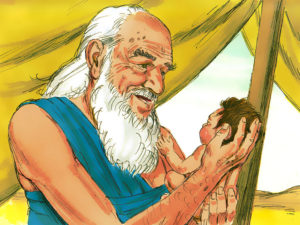 We begin with mazel tov wishes to our long time (decades) friends Beverly and Leon Mehl upon the aufruf this coming Shabbis of their son Stephan who will be marrying Chaviva Pincus. Mazel tov to both extended families.
We begin with mazel tov wishes to our long time (decades) friends Beverly and Leon Mehl upon the aufruf this coming Shabbis of their son Stephan who will be marrying Chaviva Pincus. Mazel tov to both extended families.
Raboyseyee and Ladies:
Did Avrohom Kill Yitzchok?
The First Ever Wine Cellar
Did Avrohom do what to Yitzchok and is the Oisvorfer mamish in gantzin mishuga and off the reservation for suggesting or even raising this question? Moreover, doesn’t the heylige Toirah, in this week’s bone chilling parsha -on many fronts- recount the entire story of the Akeydo (Binding) and tell us bifeirush (in plain Hebrew) that at the very last moment, efsher a millisecond, a Malach Hashem (Angel of the RBSO) called out to Avrohom and specifically told him not to harm his child and not to sacrifice him? Grada it does. As to why the question was asked, shoin, we will explore that shortly. We will open a few seemingly unrelated windows and then in true Oisvorfer form, attempt to tie them all together. Hang in.
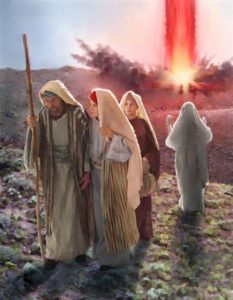 Let’s begin with a quick overview of the gantze parsha before we drill down, as did Loit on his two daughters, if you chap, also one of the hi or lo-lights found in this week’s parsha. Last week, at the tender age of 99, Avrohom lost his foreskin. This week early in the parsha, Soro will gain a uterus. Nu, when it comes to baby making, a uterus is zicher more important than is foreskin. Moreover she also begins menstruating; impressive for any women in her 50’s, miraculous mamish for a woman of 89 years. Of course when it comes to the RBSO, nothing is impossible. Shoin, with a uterus in place and her youth restored, Soro will -shortly after a Malach Hashem (Angel) predicts that she would give birth one year later- become pregnant. Yitzchok is born. The city of Sedoim and its surrounds are to be destroyed. Loit is on the save list as his wife and a few daughters. Ober, she, Mrs. Loit, did not listen to instructions. Told not to look back, she did. Shoin: she was instantly turned into a pillar of salt as she remains until today. Many say that too much salt is not good. Sadly, many women suffer from Mrs. Loit disease: they seem always to look back instead of ahead. Veyter.
Let’s begin with a quick overview of the gantze parsha before we drill down, as did Loit on his two daughters, if you chap, also one of the hi or lo-lights found in this week’s parsha. Last week, at the tender age of 99, Avrohom lost his foreskin. This week early in the parsha, Soro will gain a uterus. Nu, when it comes to baby making, a uterus is zicher more important than is foreskin. Moreover she also begins menstruating; impressive for any women in her 50’s, miraculous mamish for a woman of 89 years. Of course when it comes to the RBSO, nothing is impossible. Shoin, with a uterus in place and her youth restored, Soro will -shortly after a Malach Hashem (Angel) predicts that she would give birth one year later- become pregnant. Yitzchok is born. The city of Sedoim and its surrounds are to be destroyed. Loit is on the save list as his wife and a few daughters. Ober, she, Mrs. Loit, did not listen to instructions. Told not to look back, she did. Shoin: she was instantly turned into a pillar of salt as she remains until today. Many say that too much salt is not good. Sadly, many women suffer from Mrs. Loit disease: they seem always to look back instead of ahead. Veyter.
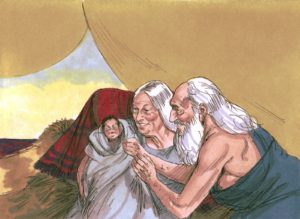 Avrohom has come upon a new way to make a living. How? Last week he had Soro lie and tell King Avimelech that she was his sister. That earned her a visit to the King’s palace and boudoir. The king wanted to acquaint Soro with his royal scepter, if you chap. The RBSO intervened: Avimelech had performance issues. Avrohom was reunited with Soro and also received many parting gifts. He left loaded and wealthy. Avrohom was avada very clever, he was after all the world’s first monotheist, the first to conclude that the world is run by a higher power, and decided to play that hand one more time. This week, in another city with a different king, he will again tell Soro to lie. He won’t even ask. Perhaps he forgot that a lie to the king can also lead to lying with the king. Again Soro is taken to the King’s boudoir and once again the RBSO will intervene to prevent the opportunistic king from sharing his magic wand, if you chap, with an eishes ish (married woman). The bottom line: in two consecutive parshas, Avrohom tried but failed to rid himself of his wife. Twice he got her back. And twice he was showered with parting gifts. Not too shabby a business model. Few would disagree that the high drama moments of the parsha are the instructions given to Avrohom to sacrifice his son Yitzchok. We will be taught that Yitzchok was 37 years of age at the time of the Akeydo.
Avrohom has come upon a new way to make a living. How? Last week he had Soro lie and tell King Avimelech that she was his sister. That earned her a visit to the King’s palace and boudoir. The king wanted to acquaint Soro with his royal scepter, if you chap. The RBSO intervened: Avimelech had performance issues. Avrohom was reunited with Soro and also received many parting gifts. He left loaded and wealthy. Avrohom was avada very clever, he was after all the world’s first monotheist, the first to conclude that the world is run by a higher power, and decided to play that hand one more time. This week, in another city with a different king, he will again tell Soro to lie. He won’t even ask. Perhaps he forgot that a lie to the king can also lead to lying with the king. Again Soro is taken to the King’s boudoir and once again the RBSO will intervene to prevent the opportunistic king from sharing his magic wand, if you chap, with an eishes ish (married woman). The bottom line: in two consecutive parshas, Avrohom tried but failed to rid himself of his wife. Twice he got her back. And twice he was showered with parting gifts. Not too shabby a business model. Few would disagree that the high drama moments of the parsha are the instructions given to Avrohom to sacrifice his son Yitzchok. We will be taught that Yitzchok was 37 years of age at the time of the Akeydo.
Shoin: a seemingly unrelated but tangential thought just entered the Oisvorfer’s head while typing, and given his age, it’s best to reduce it to writing lest he forget. We therefore interrupt the review for a paragraph to discuss the role of wine in the heylige Toirah. Soon, with help from the RBSO, we will attempt to connect wine to events in our parsha. It does appear that wine and excess drinking harkens back to pre-Toirah and Toirah times. Two shabosim back we read how Noiach disembarked the Teyvo, planted a vineyard, harvested the grapes, made and drank wine, became inebriated and was subsequently assaulted, or worse -efsher sodomized and or castrated- by one of his own boys. Shreklich! Ober, how was Noiach able to plant a vineyard? The entire world was destroyed, vegetation and all else, and punkt Noiach happened to have a few spare vines to plant? Though instructed to bring only his family, animals and provisions, he seemingly also snuck a few shoots on board. Grada a medrish will teach us that these shoots were originally planted in Gan Eden. How Noiach got his hands on them, ver veyst? Another medrish will tell us that these very shoots made their way over to Avrohom who replanted them and made wine which he served over in his eyshel. What the hec is an eyshel? Nu, according to some, it was a motel or inn where Avrohom put up guests and also fed them. Think Bed & Breakfast. And since they were mistama having cheese, avada they needed wine. Did Avrohom find and use these wine shots earlier? We shall find out.
 In any event, these very vines have been with us since parshas Bereishis. In this week’s parsha, among the many other mamish amazing and bone chilling storylines, we will read how Loit’s two daughters, noshim tzidkoniyois mamish (the most righteous of women), following the destruction of Sedoim and its neighboring cities, used wine to ply their own father. They did what? Oy vey, ober it’s emes, so says the heylige Toirah itself. They had sex with him on two consecutive nights. The older one the first night and the younger one the next. Loit was seemingly loaded in more ways than one, if you chap and both girls were instantly impregnated. They delivered babies and shoin. And the source of their shoots? Were they carrying flasks of wine as they left Sedoim? One medrish will tell us that Loit or his daughters brought the wine into the cave. Another will tell us that wine was mysteriously found in the cave. Perhaps the wine or the vines were left behind from Noiach’s time, ver veyst. Hey, it’s medrish; anything flies especially when plied with enough wine. Nu, generations later, the vines and wine used on their father, resulted in the birth of another seedling, this one in the person of no lesser a giant than Dovid Hamelech who mistama also imbibed his share. Perhaps he shared some with Batsheva, ver veyst. Let’s avada not forget that while Sedoim was burning, the RBSO was already seeding the Davidic Kingdom. Is wine then good or bad?
In any event, these very vines have been with us since parshas Bereishis. In this week’s parsha, among the many other mamish amazing and bone chilling storylines, we will read how Loit’s two daughters, noshim tzidkoniyois mamish (the most righteous of women), following the destruction of Sedoim and its neighboring cities, used wine to ply their own father. They did what? Oy vey, ober it’s emes, so says the heylige Toirah itself. They had sex with him on two consecutive nights. The older one the first night and the younger one the next. Loit was seemingly loaded in more ways than one, if you chap and both girls were instantly impregnated. They delivered babies and shoin. And the source of their shoots? Were they carrying flasks of wine as they left Sedoim? One medrish will tell us that Loit or his daughters brought the wine into the cave. Another will tell us that wine was mysteriously found in the cave. Perhaps the wine or the vines were left behind from Noiach’s time, ver veyst. Hey, it’s medrish; anything flies especially when plied with enough wine. Nu, generations later, the vines and wine used on their father, resulted in the birth of another seedling, this one in the person of no lesser a giant than Dovid Hamelech who mistama also imbibed his share. Perhaps he shared some with Batsheva, ver veyst. Let’s avada not forget that while Sedoim was burning, the RBSO was already seeding the Davidic Kingdom. Is wine then good or bad?
 Later in the heylige Toirah, we will read how Nodov and Avihu (Aharoin’s two older boys) were consumed by fire. A medrish will tell us that on that day they arrived to work totally shikkered out -efsher from too much kiddish before the Musif Avoido. The RBSO had them eliminated. On the other hand, another medrish will tell us they were very holy souls and that the RBSO was sanctified through them!? Did wine make them holier? And speaking of drinking to excess, says the heylige Gemora (Megillah 7b), azoy: “a person is obligated to become shikkur (intoxicated) on Purim to the extent that he does not know the difference between ‘Cursed is Homon and Blessed is Mordechai.'” Ober what has all this drinking to do with our parsha?
Later in the heylige Toirah, we will read how Nodov and Avihu (Aharoin’s two older boys) were consumed by fire. A medrish will tell us that on that day they arrived to work totally shikkered out -efsher from too much kiddish before the Musif Avoido. The RBSO had them eliminated. On the other hand, another medrish will tell us they were very holy souls and that the RBSO was sanctified through them!? Did wine make them holier? And speaking of drinking to excess, says the heylige Gemora (Megillah 7b), azoy: “a person is obligated to become shikkur (intoxicated) on Purim to the extent that he does not know the difference between ‘Cursed is Homon and Blessed is Mordechai.'” Ober what has all this drinking to do with our parsha?
Shoin, this past shabbis, a chaver, grada a doctor by profession, asked whether or not the Oisvorfer believes in ‘Tichiyas Hameysim’ (resurrection of the dead). His question followed a discussion during which he admitted (and cannot be convinced otherwise) that he does not believe at all in the entire story of creation, nor anything else found in the entire sefer of Bereishis. OMG! He does however believe in the RBSO and all else found in the heylige Toirah. His belief begins with the book of Shemois (Exodus). Shoin, go argue. In any event, believe it or not, his question on Tichiyas Hamaysim -resurrection- is mamish relevant and timely as we begin (just kidding; we’re half way through) our 7th review of parshas Vayero.
As the Oisvorfer has told you a few times in past years -check out the amazing archives at www.oisvorfer.com – Vayero, and its many storylines could easily have been split into several parshas. Each amazing chapter, and zicher the story of the Akeydo (the binding of Yitzchok) is deserving of its own parsha. Back to the doctor. A short time after he asked the Oisvorfer’s opinion on resurrection and had walked away, the ear-hustling Oisvorfer, overheard him asking this very question to another gentleman (loosely used) who said azoy: of course we believe in it. The good Doctor’s next question was, where in the heylige Toirah could he find such proof? And the answer he received was that this subject is discussed in the Prophets (II Kings 4:1-37) where we come across the myseh of Elisha who resurrected a young child. Ober the RBSO works in mysterious way. So happens that this particular perek (chapter) of the Novee will be read as the haftorah to this week’s parsha. Shoin: hashgocho protis!
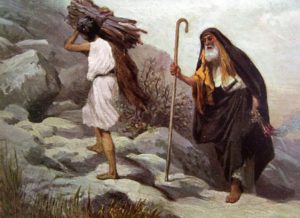 Upon hearing the exchange, the Oisvorfer chimed in and suggested that the subject of ‘tichiyas hameysim’ is also to be found in the upcoming parsha (this week) as we read the thrilling story of the Akeydo. Anyone who went to yeshiva -even if you were mostly roaming the hallways, or playing hide the salami with a friend in the bathroom, or hiding from your rebbe who wanted to teach you the game, or show you his vine, if you chap, knows the most incredible myseh of how the RBSO tested his loyal follower Avrohom by asking him to sacrifice his own son, the one he waited 100 years to have, the one the RBSO promised would inherit him and become a father unto nations. Shoin, only those with ice running through their veins are not moved and chilled yearly as the baal korah (Torah reader) reads this portion. And what the heylige Toirah tells us was that upon hearing the RBSO’s instructions, Father and son went together. Let’s recall that Yitzchok was 37 years of age at this time. Nu, let’s review a few relevant pisukim:
Upon hearing the exchange, the Oisvorfer chimed in and suggested that the subject of ‘tichiyas hameysim’ is also to be found in the upcoming parsha (this week) as we read the thrilling story of the Akeydo. Anyone who went to yeshiva -even if you were mostly roaming the hallways, or playing hide the salami with a friend in the bathroom, or hiding from your rebbe who wanted to teach you the game, or show you his vine, if you chap, knows the most incredible myseh of how the RBSO tested his loyal follower Avrohom by asking him to sacrifice his own son, the one he waited 100 years to have, the one the RBSO promised would inherit him and become a father unto nations. Shoin, only those with ice running through their veins are not moved and chilled yearly as the baal korah (Torah reader) reads this portion. And what the heylige Toirah tells us was that upon hearing the RBSO’s instructions, Father and son went together. Let’s recall that Yitzchok was 37 years of age at this time. Nu, let’s review a few relevant pisukim:
| 9. And they came to the place of which God had spoken to him, and Abraham built the altar there and arranged the wood, and he bound Yitzchok his son and placed him on the altar upon the wood. | טוַיָּבֹאוּ אֶל הַמָּקוֹם אֲשֶׁר אָמַר לוֹ הָאֱלֹהִים וַיִּבֶן שָׁם אַבְרָהָם אֶת הַמִּזְבֵּחַ וַיַּעֲרֹךְ אֶת הָעֵצִים וַיַּעֲקֹד אֶת יִצְחָק בְּנוֹ וַיָּשֶׂם אֹתוֹ עַל הַמִּזְבֵּחַ מִמַּעַל לָעֵצִים: | |
| 10. And Abraham stretched forth his hand and took the knife, to slaughter his son. | יוַיִּשְׁלַח אַבְרָהָם אֶת יָדוֹ וַיִּקַּח אֶת הַמַּאֲכֶלֶת לִשְׁחֹט אֶת בְּנוֹ: | |
| 11. And an angel of God called to him from heaven and said, “Abraham! Abraham!” And he said, “Here I am.” | יאוַיִּקְרָא אֵלָיו מַלְאַךְ יְהֹוָה מִן הַשָּׁמַיִם וַיֹּאמֶר אַבְרָהָם | אַבְרָהָם וַיֹּאמֶר הִנֵּנִי: | |
| 12. And he said, “Do not stretch forth your hand to the lad, nor do the slightest thing to him, for now I know that you are a God fearing man, and you did not withhold your son, your only one, from Me.” | יבוַיֹּאמֶר אַל תִּשְׁלַח יָדְךָ אֶל הַנַּעַר וְאַל תַּעַשׂ לוֹ מְאוּמָה כִּי | עַתָּה יָדַעְתִּי כִּי יְרֵא אֱלֹהִים אַתָּה וְלֹא חָשַׂכְתָּ אֶת בִּנְךָ אֶת יְחִידְךָ מִמֶּנִּי: |
And there lie Yitzchok bound and tied, ready to be sacrificed. Avrohom with sword in hand is ready to slaughter his son when suddenly out of nowhere a Malach Hashem (Angel of God) suddenly tells Avrohom to abort the mission. Avrohom has passed the test of true loyalty to the RBSO.
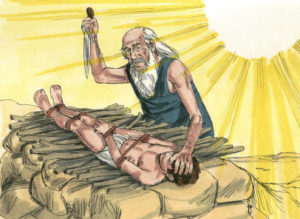 As an aside, all agree that the RBSO challenged our zeyda Avrohom’s faith with ten different tests. Again, we all know that factoid since our first days in yeshiva. Ober, what we didn’t know is that not all agree as to what the ten tests consisted of. And guess what? There are not two and not three, but four differing opinions as to which challenges make up the list of the ten tests. The good news: all agree and who wouldn’t, that the instructions to sacrifice his only son makes the list. Three of the four opinions have this challenge as #10 on the list, while Rabaynu Yoina, he most well known for giving mussir (chastisement), has the akeydo listed as #9, with the burial of Soro (two parshas ahead) as #10.
As an aside, all agree that the RBSO challenged our zeyda Avrohom’s faith with ten different tests. Again, we all know that factoid since our first days in yeshiva. Ober, what we didn’t know is that not all agree as to what the ten tests consisted of. And guess what? There are not two and not three, but four differing opinions as to which challenges make up the list of the ten tests. The good news: all agree and who wouldn’t, that the instructions to sacrifice his only son makes the list. Three of the four opinions have this challenge as #10 on the list, while Rabaynu Yoina, he most well known for giving mussir (chastisement), has the akeydo listed as #9, with the burial of Soro (two parshas ahead) as #10.
Nu, that was zicher a very long introduction to get to the main point and question: Did Yitzchok survive the Akeydo? Or, was he in fact killed? Did he somehow die while waiting to be slaughtered or saved? Ober, what kind of idiotic questions are these when the heylige Toirah attests to the fact that a Malach came down and at the very last second instructed Avrohom not to harm his child? Not such a stupid one! We shall now explore what may have happened to Yitzchok. Did he die or was he killed? Was he dead but then suddenly resurrected? Do we believe in resurrection? Were the umois ho’oilom (our Christian brothers and sisters) inspired by the Akeydo incident? Did they then run with it? Nu, lommer lernin a few amazing medroshim: they won’t kill you; if they do, efsher you too can be resurrected.
Said Rebbe Yehudah something quite shocking, azoy: “when the knife touched Yitzchok’s neck, his neshomo (soul) flew out of his body.” He was dead mamish! What happened next? Let’s recall that as Avrohom was about to make the cut, a heavenly voice (the Malach) called out and said “Do not send your hand to hurt the youth.” Just then, Yitzchok’s neshomo was sent back down. He stood up on his feet and immediately realized that he was just resurrected, and that in the future, the dead will be resurrected the same way. What next? He recited the following brocho: Blessed are you Hashem who resurrects the dead.
Ober, where have we seen this brocho before? Shoin, another klutz kasha (stupid question)! Those who daven thrice daily, or even once daily, should recognize these words as they are the last five words of the second paragraph of the ‘shemoinoh esray (silent prayer.) Shoin: and there you have a source for resurrection. Yitzchok died but was immediately resurrected. And where can you find this medrish? Parts of it were quoted directly from Pirkei d’rebbe Eliezer- 30), avada not to be confused with Pirchei D’ some other rebbe(s) who tired showing a number of you, Oisvorfer included, their own swords, if you chap. Nu, at least they weren’t out to kill; farkert, theirs were to make you come alive, if you chap.
In other words: Yitzchok taka died but only temporarily. Ober what would inspire the medrish and Rebbe Yehuda to suggest anything but what the text told us? And what it told us was that Yitzchok was unharmed. Nu, we need to recall that medrish is driven by what the text does not tell us, and what it does not tell us, is what happened to Yitzchok following the Akeydo incident. In other words: another gaping lacuna! Says the heylige Toirah (Bereishis 22:19) “Avrohom then returned to his servant lads; they got up and traveled to Be’er Sheva, and Avrohom settled in Be’er Sheva.” Givaldig! Ober, where the hec is Yitzchok? Avrohom and Yitzchok ascended the mountain but only Avrohom descended? Shoin, because the heylige Toirah is silent on Yitzchok’s whereabouts, the door was seemingly left wide open for speculation, and Rebbe Yehudah filled in the gaps by telling us that since Yitzchok did not accompany his father off the mountain, he must have died. Shoin.
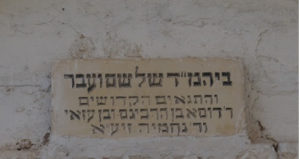 On the other hand, since we do know that he was either alive, or dead then resurrected, the shaylo (question) remains as to why he didn’t accompany his own father off the mountain. Nu, one medrish tells us that Yitzchok wound up where other Toirah personalities before and after him turned up after going missing, namely in the yeshiva. Which yeshiva? The famous (though maybe mythical) yeshiva of Shem Vo’eyver of course where they studied ver veyst vus (who knows what). Then again, if your father marched you up the mountain, tied you up like an animal, was about to slaughter you, drew the knife and either did or didn’t kill you, but you somehow either survived or were born again, would you accompany your father down the mountain and travel with him? Anywhere? Would you ever talk to him again? Mistama not! And since Yitzchok did not know if his mother was a co-conspirator, or stam fooled by her husband, he decided not to chance it, and instead chose safety over family and went about his own way. Another medrish, based on text we will come across when Yitzchok And Yishmoel get together to bury Avrohom, will tell us that Yitzchok was just on his way back from a place known as Be’er Lachai Roi’ee. What the hec was he doing there? Seemingly that’s where Hogor settled. Efsher he felt safer with her. She was no stranger to abusive relationships having been kicked out and displaced by Soro. Perhaps Yitzchok felt comfortable there after the near massacre atop the mountain, ver veyst. As to where he taka went, we don’t know for sure. It appears from the text that taka he and his father went their own ways. Speaking of fooling the eishes chayil, one medrish will tell us that upon leaving the house towards the Akeydo, Avrohom lied to his wife and told Soro he was taking Yitzchok to an out-of-town yeshiva. In generation to come, inspired by Avrohom, many other husbands would, and continue ad hayoim hazeh (until today) to lie to their wives when leaving the house. Nu, it certainly wasn’t the first time Avrohom concocted a story. As an aside, Shem Vo’eyver type yeshivas did eventually really exist and were filled with students looking to avoid the war over in Viet Nam.
On the other hand, since we do know that he was either alive, or dead then resurrected, the shaylo (question) remains as to why he didn’t accompany his own father off the mountain. Nu, one medrish tells us that Yitzchok wound up where other Toirah personalities before and after him turned up after going missing, namely in the yeshiva. Which yeshiva? The famous (though maybe mythical) yeshiva of Shem Vo’eyver of course where they studied ver veyst vus (who knows what). Then again, if your father marched you up the mountain, tied you up like an animal, was about to slaughter you, drew the knife and either did or didn’t kill you, but you somehow either survived or were born again, would you accompany your father down the mountain and travel with him? Anywhere? Would you ever talk to him again? Mistama not! And since Yitzchok did not know if his mother was a co-conspirator, or stam fooled by her husband, he decided not to chance it, and instead chose safety over family and went about his own way. Another medrish, based on text we will come across when Yitzchok And Yishmoel get together to bury Avrohom, will tell us that Yitzchok was just on his way back from a place known as Be’er Lachai Roi’ee. What the hec was he doing there? Seemingly that’s where Hogor settled. Efsher he felt safer with her. She was no stranger to abusive relationships having been kicked out and displaced by Soro. Perhaps Yitzchok felt comfortable there after the near massacre atop the mountain, ver veyst. As to where he taka went, we don’t know for sure. It appears from the text that taka he and his father went their own ways. Speaking of fooling the eishes chayil, one medrish will tell us that upon leaving the house towards the Akeydo, Avrohom lied to his wife and told Soro he was taking Yitzchok to an out-of-town yeshiva. In generation to come, inspired by Avrohom, many other husbands would, and continue ad hayoim hazeh (until today) to lie to their wives when leaving the house. Nu, it certainly wasn’t the first time Avrohom concocted a story. As an aside, Shem Vo’eyver type yeshivas did eventually really exist and were filled with students looking to avoid the war over in Viet Nam.
Nu, earlier we mentioned and wrote an entire paragraph about vines, wine, drinking and what happened to Noiach, Loit, and Aharoin’s boys as a result. Ober those incidents pale by comparison when you read this amazing myseh. Lommer lernin: Says the heylige Gemora (Migillah 7B), azoy: Rabba and Rebbe Zeyra got together to celebrate the Purim seudah (festive meal). They both drank to excess. In other words: they were both shikkur. Rabba stood up and killed Rav Zayro. He was dead, mamish! On the morrow, Rabba felt remorse for having killed his drinking buddy. He davened for him and shoin, he was brought back to life. Seemingly they reconciled because on the following Purim, Rabba again invited Rav Zeyra for the Purim seuda. Ober said Rav Zeyro azoy: “A miracle does not happen every moment.” And what is the heylige Gemora teaching us? That both Rabba and Reb Zeyro believed in ‘tichiyas hamaysim.’ Did this story ever happen in real life? Ver veyst: certainly there are those who claim that this myseh is but allegorical, ober there are just as many, who insist that the story is very real.
And if that Gemora didn’t shock you, listen to this: Says the medrish (Midrash Rabbah, Bereishis 38:13) azoy: Avrohom’s own father, Terach, hand delivered Avrohom to Nimrod from whom Avrohom had been hiding. Nimroid proceeded to throw Avrohom into a fiery furnace. And guess what? Avrohom walked out alive. Did he? Or, did he efsher also die and was then resurrected? Ver veyst? And if that story is real and why shouldn’t it be though it’s a medrish, efsher we can kler that Avrohom wasn’t all that concerned about having to slaughter his son Yitzchok. Efsher his emuna (faith) was so strong that he believed Yitzchok would experience tichiyas hamaysim, resurrection. Go prove otherwise.
As an aside, says the Pirkei D’Rebbe Eliezer azoy: prior to Avrohom being delivered to Nimroid, he was in hiding. He was holed up either underground, or efsher also in a cave. How long was he there? Nu that depends on who you ask. The Oisvorfer has seen three differing opinions ranging from three to fourteen years. And during that entire time period, Avrohom did not see the sun or the moon. Efsher we can kler (Oisvorfer speculation) that Avrohom survived those years as a result of finding either shoots or wine mamish, enough to keep him going during that period. Fourteen years underground is serious time. Ober what was the source of the shoots or wine? Nu, efsher these were the very shoots that were planted in Gan Eden, later used by Noiach and then passed on (as mentioned above) to Avrohom, who carried them with him as he fled Nimroid. Wait: It gets better. Later on, Avrohom replanted these very shoots and used the wine to serve in his Bed & Breakfast. Grada that would make sense as by the then, the wine was fully and properly aged, and would have commanded premium prices. Did Avrohom then have the first wine cellar?
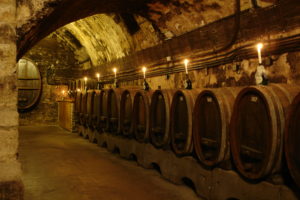 Efsher you’re klerring azoy: Who the hec was Nimroid and why was Avrohom on the run from this fellow? Shoin, the heylige Toirah only mentions that Nimroid was the king of Shinar. Ober the medrish, a few of them, have mamish amazing storylines built around Nimroid, Terach (Avrohom’s father), and Avrohom himself. Bikitzur, in one version, Nimroid was angered by Avrohom’s preaching monotheism and decided to dispense with him. Nimroid was not just an idol worshipper but also in the idol gisheft (business). We can speculate that he was either the manufacturer or the distributor. We know this because another medrish tells us that Avrohom’s own Father Terach was also in the idol business though he was but a retailer. Shoin, Nimroid supplied; Terach sold retail. And Avrohom? The medrish tells us that he smashed the idols. Shoin: Terach had no inventory to sell and could not pay Nimroid. Nimroid was pissed off; it’s one thing to be a believer but an entirely new level of chutzpah, so thought Nimroid, for Avrohom to hurt his business. He was after all the king. Happy king, happy subjects. Nimroid was not happy. The palace needed funds to feed the harems. Shoin: Avrohom was sentenced to death. Nimroid threw or forced him into a furnace. How old was Avrohom at this time? Quite young. Either a baby, or certainly under ten years of age. In another version, Avrohom was hidden along with his mother (and wine) at birth, also because Nimroid wanted to kill him as a baby, and didn’t emerge until he was either three, ten or fourteen. Science fiction? fantasy? Emes? Which, if any of these medroshim are emes? Ver veyst; they do however make for great reading and avada we need to appreciate the ingenuity of these great exegetes.
Efsher you’re klerring azoy: Who the hec was Nimroid and why was Avrohom on the run from this fellow? Shoin, the heylige Toirah only mentions that Nimroid was the king of Shinar. Ober the medrish, a few of them, have mamish amazing storylines built around Nimroid, Terach (Avrohom’s father), and Avrohom himself. Bikitzur, in one version, Nimroid was angered by Avrohom’s preaching monotheism and decided to dispense with him. Nimroid was not just an idol worshipper but also in the idol gisheft (business). We can speculate that he was either the manufacturer or the distributor. We know this because another medrish tells us that Avrohom’s own Father Terach was also in the idol business though he was but a retailer. Shoin, Nimroid supplied; Terach sold retail. And Avrohom? The medrish tells us that he smashed the idols. Shoin: Terach had no inventory to sell and could not pay Nimroid. Nimroid was pissed off; it’s one thing to be a believer but an entirely new level of chutzpah, so thought Nimroid, for Avrohom to hurt his business. He was after all the king. Happy king, happy subjects. Nimroid was not happy. The palace needed funds to feed the harems. Shoin: Avrohom was sentenced to death. Nimroid threw or forced him into a furnace. How old was Avrohom at this time? Quite young. Either a baby, or certainly under ten years of age. In another version, Avrohom was hidden along with his mother (and wine) at birth, also because Nimroid wanted to kill him as a baby, and didn’t emerge until he was either three, ten or fourteen. Science fiction? fantasy? Emes? Which, if any of these medroshim are emes? Ver veyst; they do however make for great reading and avada we need to appreciate the ingenuity of these great exegetes.
A gittin Shabbis
Heylige Oisvorfer Ruv
Yitz Grossman
